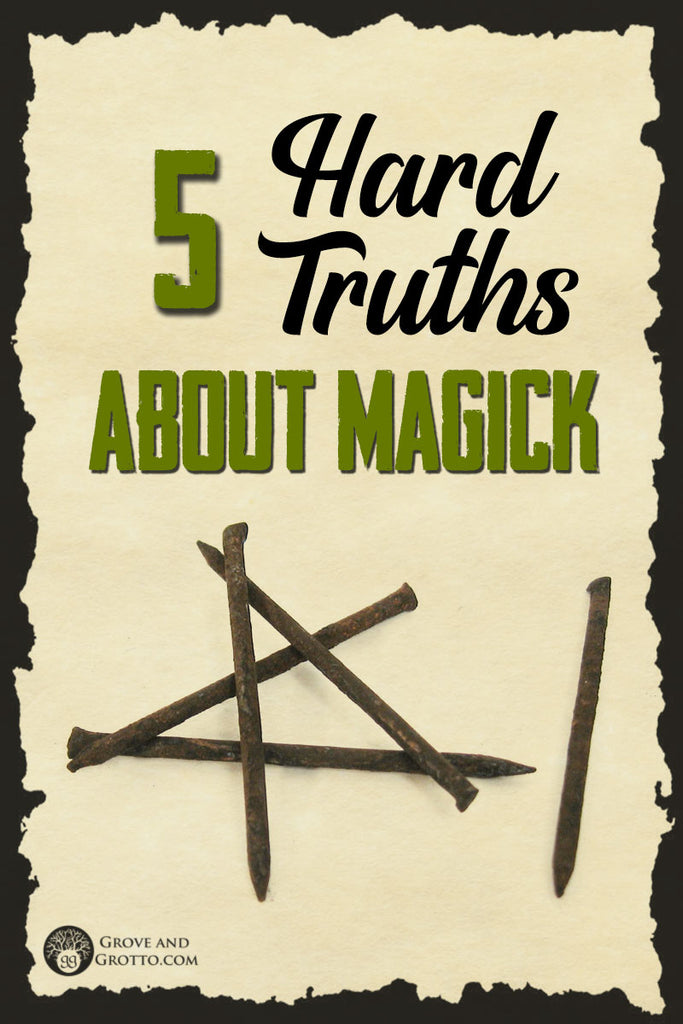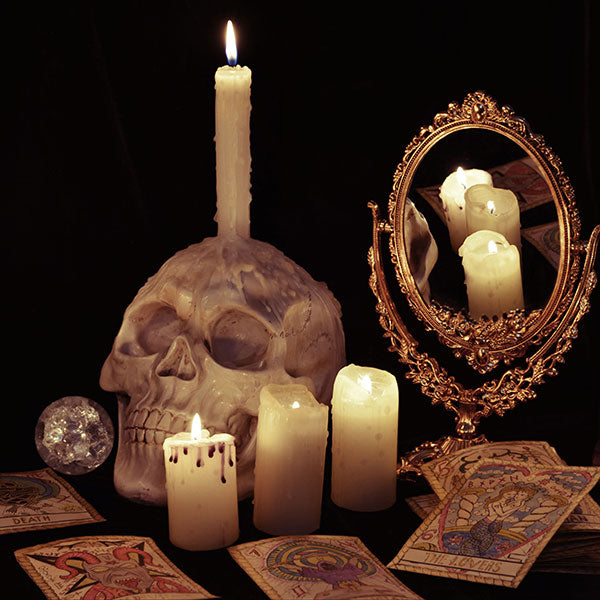
Of the many laws of magick, there are a few that you’ll never see on a T-shirt or affirmation board. Here, we’ll cover some of the tough stuff: The harsh, the unsettling, the ambiguous facts of living an enchanted life.
This article was inspired by some recent discussions of false positivity—that is, the habitual repetition of encouraging words and images. In short, false positivity means well, but it does harm by shutting down discussion of anything problematic. You can’t hide the truth forever—and when you try, it seeps out in sneaky and unexpected ways.
There are certain aspects of magick that are difficult to come to terms with. The purpose of airing them is not to discourage anyone from their path, but to counter some of the shallow advice and empty promises that the witchy blogosphere churns out.
It’s time for some straight talk about magick—some Swords to go with your Cups, some Rue with your Roses.
1. It's not for everybody.

Can anyone become a Witch? Any honest answer to this question is complicated. In some ways, yes—the magickal arts are open to all who seek them. In other ways, no. Some people lack the gifts, the learning—but most often, the dedication—to become effective practitioners of the Craft.
These two are the fundamental magickal skills: The ability to alter reality through will. And, the ability to perceive things beyond the normal senses. These experiences are part of our natural state of being. They are, in a sense, the birthright of every conscious creature.
Yet these abilities are constrained on our earthly plane and must be located and cultivated. You need a strong will to accomplish this. It takes repetition. It takes humility. It often requires help from others—partners, spirits, plants, disparate parts of self—whose cooperation you must earn.
In short, excelling in magick is just like excelling in business or music or athletics. Not every aspirant will have what it takes. Talent only gets you so far. Hard work isn’t always enough. Sometimes you do everything right and still don’t get the results you want.
It’s not easy. It’s not for everyone (or at least, not all of the time).
2. Real witchcraft isn't photogenic.

Thick black eyeliner, a bespoke cloak, moon tattoos, and a table full of Amethysts—that’s what magick is made of, right? Sure, if you believe the internet. Like so many other things, witchcraft has been co-opted in recent years by lifestyle bloggers and tastemakers, advertisers and influencers. Super-stylish, just-edgy-enough witchy pics go hand-in-hand with the idea that magick is a piece of cake.
What’s wrong with enjoying all these highly performative images of witchcraft? Nothing! There’s no reason a person can’t be genuinely magickal and also extremely good at self-presentation. Visual art is a kind of magick, too. However, let’s not make the mistake of confusing Instagram witches with the real thing.
It’s even possible for personal magick and social media to work at cross-purposes. Oversharing violates the principle of magickal silence—the idea that talking about your workings can dilute or disperse their energy. People who endlessly photograph their working tools, altars, and ritual garments are arguably siphoning off some of their power for the sake of likes and followers.
Thinking back about the most powerful magick I’ve witnessed, much of it has been in the dark, among old or shabbily dressed people, with nary a smartphone in sight. The most eye-opening books I own are crappy dog-eared paperbacks that would look terrible in a tableau with a crystal pendant and a sprig of Rosemary. Pinterest offers no altar porn for the third eye…you’ll have to find those goodies on your own.
3. Magick is dangerous.

The Satanic Panic of the 1990s was in full swing when I first embarked on my magickal studies. The media often reported on the addiction, insanity, and death that were the obvious consequences of dabbling in the occult. Religious tracts and books warned against the dangers of “gateway” activities like drum circles and Harry Potter books. I used to hoard these writings and snicker at them. What a quaint idea—that devils stalk the earth, seeking the ruin of souls through Ouija boards and zodiac pendants!
With more experience, I see a grain of truth in those zealous warnings. It’s not all rainbows and butterflies out there, folks. Different magicians have different opinions about whether spirit entities have an external reality or only dwell within the mind of the magick worker. I can’t prove it either way, of course. But my own instinct says that entities are real, they have independent consciousness, and not all of them have your best interests in mind.
Not scared of spirits? Fine—let’s go to the energy model of magick. Playing with spiritual technologies—meditation, invocation, astral travel—can cause extreme and rapid shifts in your energy body. They can wreck your appetite and mess with your sex life. They can effect changes in your mood and sleep cycle that will disrupt every aspect of your daily existence.
Other hazards of the occult are more pedestrian: You can become arrogant (common!). You can turn into a colossal bore who only talks to plants (and even the plants wish you would shut up). You can invite the scorn of people who don’t approve of your path, people who formerly respected you. It’s hard to keep your spiritual and mundane lives in balance—but it’s absolutely necessary if you want to make magick a lifelong quest.
Anything worthwhile carries some risk. With magick, we are talking about nothing less than the rapid evolution of the soul…so it only makes sense than the risks would be commensurate with the reward. Only you can weigh the dangers and decide if it’s worth doing. (See #1: It’s not for everybody.)
4. You (probably) need tools for effective spellwork.

“Cast spells without tools!”
“The secret of mental magick!”
“Advanced witchcraft!”
There’s a whole slew of authors and teachers offering instruction in tool-less spellcraft. And yeah, technically they’re correct: The only tool you really need is your focused, unadulterated Will.
But therein lies the problem. How many of us actually possess a focused, unadulterated Will? We’re human! Our thoughts are always mixed with distractions, mental noise, memories, and misgivings. Magick without tools is theoretically do-able…but in practice, it’s rarely as effective.
It’s true that intention is the most important component in spellwork. It’s true, also, that the more practiced you become with certain skills (visualization and trance induction), the less you tend to rely on the externals. However…
Magickal tools—and I’m not just saying this as a shop owner—tools play a very important role. Several roles, actually. That’s why Witches—yes, even “advanced” ones, have employed them for centuries.
What do tools accomplish that thoughts alone do not? Here’s a sampling:
1. Anchoring: Tools link your intention in the physical plane (which is where you want the results to manifest, right?) Most magick spells can be conceived as a kind of cycle—from earthly need to thought/will and back to physical action. Tools complete the loop by grounding your petition in the present time and place.
2. Distraction: Tools subvert the less-magickal parts of the brain (mental chatter, worries, skepticism) by engaging the older, more primal parts. Tying knots, lighting incense, and dressing candles are all classic ways to activate spells. You could say these actions let your magickal self do its work by keeping the mind and body busy.
3. Correspondence: Spell ingredients like herbs and candles contribute allied energies to your spell. The magickal brain is both literal and sensual. To a person who is very familiar with lemons, the thought of a lemon is enough to invoke Solar energy. But if you have an actual lemon—bright and yellow and soaked in the summer sun—that’s better, you know? I refer to Randall Garrett’s maxim: “The best symbol for a sharp knife is a sharp knife.”
4. Effort: The extra work of using tools is a gatekeeper that separates the worthy spells from the unworthy ones. When you go through the trouble to acquire and prepare materials, you’re signaling to your unconscious that this spell actually matters—and that will generally translate to better results.
Magickal tools don’t have to be complicated, and they don’t have to be expensive. (See our list of cheap and free witchcraft tools.) A candle and some oil. A pen and a piece of paper. Keep it focused: An over-encumbered spell is just as a bad as a flimsy one.
Unless you are a super-adept—like, the kind of master that comes along once in a zillion years—you probably can’t just speak or dream your desires into being. Spells without tools are more akin to…wishes. It’s fun to make a wish, but they usually don’t come true on their own.
5. There are no experts.

“We’re all apprentices in a craft where no one becomes a master.” Ernest Hemingway was referring to writing, but the same can certainly be said of the metaphysical arts.
Magick is a vast and mysterious topic. There’s a natural instinct to look up to people who have been at it longer than you, or who seem to be more sure of themselves. But while some people are objectively more accomplished, there’s nobody who’s got it all figured out. We are all grappling with the inexplicable mystery of consciousness. We are all grasping at forms we can’t possibly see the shape of.
It’s scary to realize that everybody else is basically flying blind. But it’s liberating, too. When you stop relying on others to show you the way, you can begin to truly explore your own power.
And there you have it...five tough nuggets. I don't expect that this will become one of my most popular blog posts ever, but I'm happy that I published it. What are your hard-won magickal truths? Share with other readers in the comments!
Browse the archive here.
